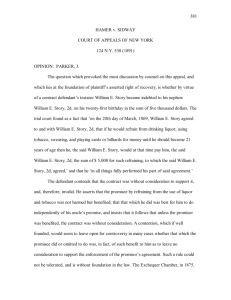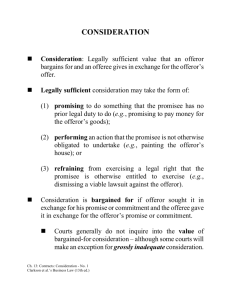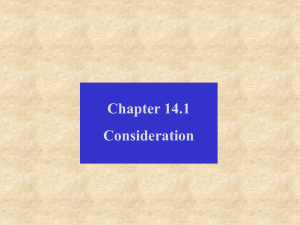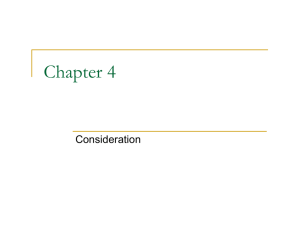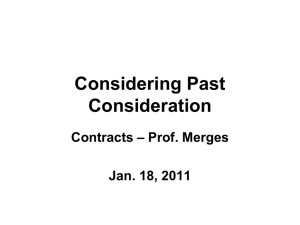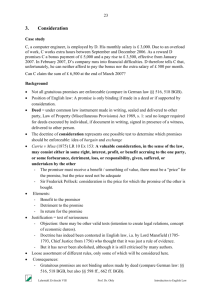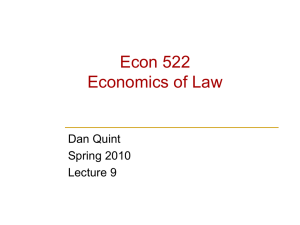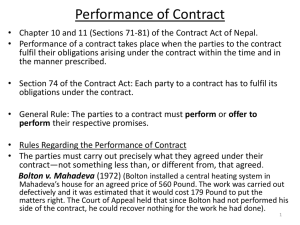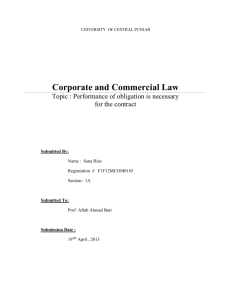11 consideration
advertisement
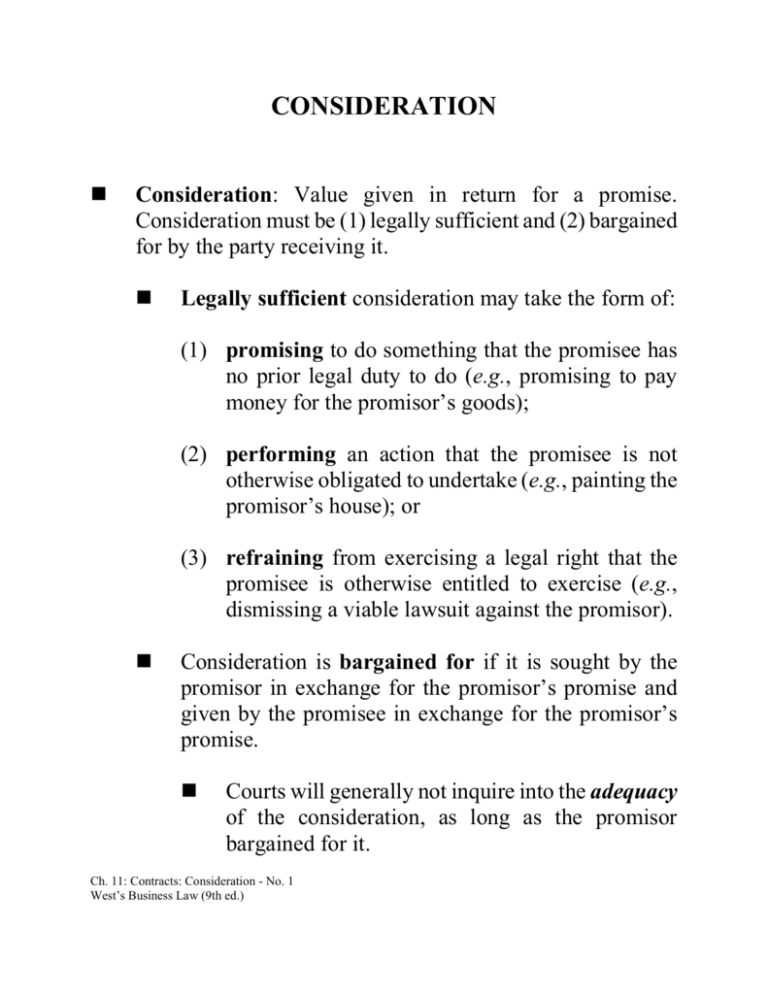
CONSIDERATION Consideration: Value given in return for a promise. Consideration must be (1) legally sufficient and (2) bargained for by the party receiving it. Legally sufficient consideration may take the form of: (1) promising to do something that the promisee has no prior legal duty to do (e.g., promising to pay money for the promisor’s goods); (2) performing an action that the promisee is not otherwise obligated to undertake (e.g., painting the promisor’s house); or (3) refraining from exercising a legal right that the promisee is otherwise entitled to exercise (e.g., dismissing a viable lawsuit against the promisor). Consideration is bargained for if it is sought by the promisor in exchange for the promisor’s promise and given by the promisee in exchange for the promisor’s promise. Courts will generally not inquire into the adequacy of the consideration, as long as the promisor bargained for it. Ch. 11: Contracts: Consideration - No. 1 West’s Business Law (9th ed.) INADEQUATE CONSIDERATION Pre-Existing Legal Duty: A promise to do (or refrain from doing) what one already has a legal duty to do (or refrain from doing) generally does not constitute legally sufficient consideration. However, under the “unforeseen difficulties” doctrine, an existing contract may be modified to account for unforeseen difficulties that arise during the course of performance. In such a case, the promisee’s obligation under the modified contract is new consideration. Likewise, if the parties agree to replace an existing contract with a new, superseding contract, the promise to perform the new contract is a new promise; and, thus, not a promise to perform a pre-existing legal duty. Past Consideration: Promises made in return for acts or events that have already taken place are unenforceable for lack of sufficient consideration. Ch. 11: Contracts: Consideration - No. 2 West’s Business Law (9th ed.) RESCISSION AND SUPERSEDING CONTRACTS Rescission: Canceling an existing contract, and returning the parties to their pre-contract states. Substitute Contract: Replacing an existing contract with a new, superseding contract between the same parties. Novation: Replacing an existing contract with a new, superseding contract binding one or more new parties in place of one or more parties to the original contract. Ch. 11: Contracts: Consideration - No. 3 West’s Business Law (9th ed.) UNCERTAIN OBLIGATIONS Illusory Promises: If the terms of a contract call for performance in such uncertain terms that the promisor has not definitely promised to do (or refrain from doing) anything, the contract is unenforceable for lack of sufficient consideration. Requirements Contract: A contract whereby the buyer agrees to purchase all of the goods of a designated type she needs from the seller. Requirements contracts are not illusory, despite the uncertainty whether the buyer will actually require any of the designated goods (and, if so, how many). Output Contract: A contract whereby the seller agrees to sell all of the goods of a designated type it produces to the buyer. Output contracts are not illusory, despite the uncertainty whether the seller will actually produce any of the designated goods (and, if so, how many). Options to Cancel: If the terms of a contract give one party the option to cancel at any time (including before the other party begins to perform), for any reason, without prior notice, the contract is unenforceable for lack of sufficient consideration. Ch. 11: Contracts: Consideration - No. 4 West’s Business Law (9th ed.) ACCORD AND SATISFACTION Accord and Satisfaction: An agreement between an obligor (debtor) and obligee (creditor), by which the obligor agrees to pay the obligee some amount owed under the contract (generally less than the amount in dispute) in exchange for a discharge of all obligations owed by the obligor to the obligee. For accord and satisfaction to occur, the amount of the obligor’s debt to the obligee must be in dispute, or unliquidated. Liquidated Debt: A debt whose amount has been ascertained, fixed, agreed on, settled, or exactly determined. Unliquidated Debt: A debt whose amount may be disagreed on by reasonable persons. Ch. 11: Contracts: Consideration - No. 5 West’s Business Law (9th ed.) RELEASES AND COVENANTS NOT TO SUE Release: An agreement whereby one party forfeits its rights to pursue a legal claim against another party. Releases are generally binding if they are: (1) given in good faith, (2) written, and (3) accompanied by consideration. Covenant Not to Sue: An agreement to substitute a contractual obligation for some other type of legal action based on a valid claim. Ch. 11: Contracts: Consideration - No. 6 West’s Business Law (9th ed.) PROMISES ENFORCEABLE WITHOUT CONSIDERATION Promissory Estoppel: When a promisor makes a clear and definite promise on which the promisee justifiably relies, the promisor is bound by the promise, even if it was insufficient to form the basis of a valid, legally binding contract. Promissory estoppel requires the following elements: (1) the promise was clear and definite; (2) the promisee justifiably relied on the promise; (3) the promisee’s reliance was substantial and of a definite character; and (4) enforcing the promise will serve the best interests of justice. Other Promises Enforceable Without Consideration: Courts may also enforce, despite the lack of consideration, (1) promises to pay a debt otherwise discharged by limitations; and, in rare cases, (2) promises to charitable institutions. Ch. 11: Contracts: Consideration - No. 7 West’s Business Law (9th ed.)
